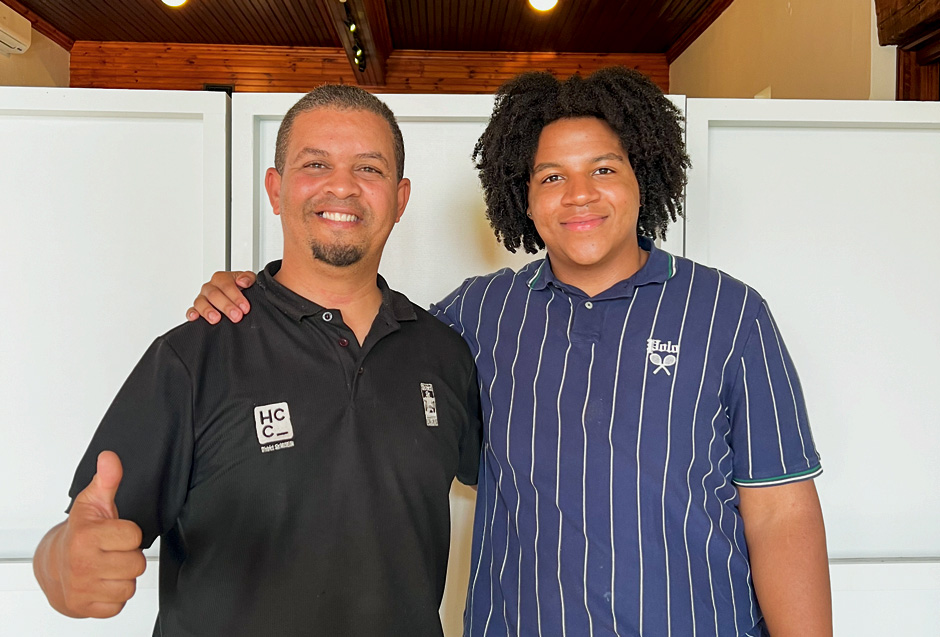Kieran Collins has long dreamed about studying abroad—he heard all the wonderful stories from his brother who attended a program in Italy—and was considering the popular destinations of Rome, Paris, and London when the option for the University of Miami’s program in Cape Town, South Africa, popped up.
“I saw that it was the only option in Africa and thought what a beautiful opportunity to spend three months living in a foreign place that I didn’t know if I’d ever be able to visit in my adult life,” said Collins, a rising senior majoring in marketing and business in the Miami Herbert Business School.
In preparation for Study Abroad’s UCape Town semester-long program this spring, Collins read books and watched lectures, learning what he could about the country and its history, but he recognized that he knew little about the country’s cultural aspects before arriving.
Yet, South Africa is an English-speaking country, so Collins found it easy to navigate the city. And what he’s learned, especially as part of an internship with the District Six Museum, has awakened his passion and left an indelible imprint.
Originally from Chicago, Illinois, Collins did a high school internship with PepsiCo, working on a marketing team that focused on consumer sales. He decided to attend the University of Miami when offered a scholarship and has focused on honing those skills toward a career.
“I was really looking to transfer that skill that I already had, making it into a bigger, better thing,” he said.
During the UCape Town program, students immerse themselves in South African culture by integrating the university-student experience with service learning and organized field trips throughout South Africa.
Through an academic partnership with the CIEE abroad program, University students study at the University of Cape Town, the continent’s top-ranked university.
“Students who attend UCape Town often tell us that the program, both through the academics and learning about the culture and history of such a fascinating country, is among their most valuable college experiences,” said Alejandra Grijak, assistant director of the Office of Study Abroad.
Offered the opportunity to take a cultural class or an internship, Collins opted for the work experience and interned at District Six. He has invested 15 hours weekly over the three months, lending his marketing skills, especially for the District Six Experience, to help secure funds to purchase VR headsets so that museum visitors can listen and witness the history of the once-vibrant urban neighborhood.
“I’m really happy with that placement decision,” he said. “When I first heard about the museum project it was really powerful, and it would have been sad—a disgrace—if such an important thing to so many people died out.”

For the “experience,” visitors put on goggles to watch VR programming where they “walk” in the neighborhood, listening to archival sounds to understand how the enclave was before its inhabitants were displaced and the neighborhood literally torn down, he explained.
In the 1960s, as part of the Group Areas Act implemented by the apartheid government, an estimated 60,000 residents, mostly Black South Africans, were forcibly displaced to the city’s periphery. The area was designated for “whites-only.”
“Non-white people were moved to the townships and settlements outside the cities. The government tore down all the buildings and monuments that were important, but they were able to keep some of the foundational Bo Kaap houses,” Collins explained.
Richard Grant, a professor in the Department of Geography and Sustainable Development in the College of Arts and Sciences who has directed the summer program in Cape Town since 2005, called Collins a “trailblazer” for his initiative.
“The museum didn’t have the funding to get more headsets to put on the program; they had to borrow the headset to put on a single event,” said Collins, who last summer did an internship with the global media firm AEG Worldwide. “So, my main goal has been to reach out to different companies, organizations, even the government to build the connections and pitch the idea so that they could see the value of the project.”
What was his sales pitch?
“That this is a way for the history not to be diminished, for people to be able to relive the opportunities that were taken from them so long ago,” he said.
Companies have been hesitant to contribute, Collins noted, because they generally want to see how their investment could be built into a business or product, and the return on investment just isn’t as fast as some companies might want. The value is more of funding an experience that gives back to the community, he pointed out.
He gave a final presentation on his experience project in late May and finished his exams and coursework. A museum colleague asked if he’d been willing to put together an outline for a marketing plan.
“I’m going to do that, for sure,” Collins said. “I’ve essentially been working on it these past three months and have become pretty passionate about the project.”
Applications for next spring's UCape Town program are already open on the Study Abroad website.

